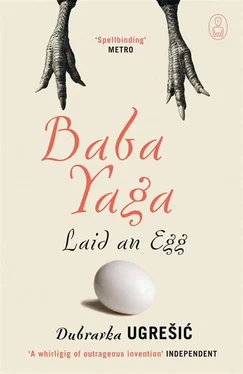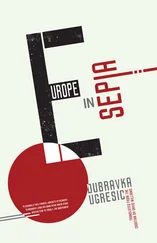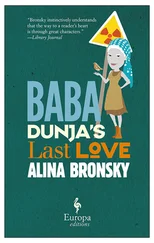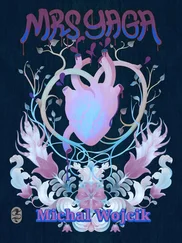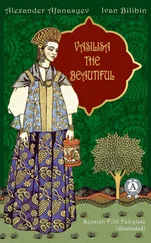The dream had been horrifying and Beba woke up. She shook herself, her cheeks, wet with tears, were trembling and her heart was beating violently. Still sobbing, Beba got out of bed, went to the fridge and took out a bottle of champagne. She sat for a long time on the edge of the bed, calming her heart, drinking the champagne in rapid, small sips like water and – staring at the round moon. Oh, what a nightmare! Beba tried to separate the tangled threads of the dream, but they just kept getting more tangled. Like a glittering medallion, the golden body of her son in the foetal position flickered in front of her eyes. The moon had grown pale and become almost transparent by the time Beba, dazed with champagne and exhausted by successive sobs, finally fell asleep.
Beba and Kukla were pleasantly surprised at breakfast the following morning, when they caught sight of the elegant young man whom Beba had almost knocked over the previous day in the hotel doorway. A still greater surprise ensued when the young man got up from his table, came over to theirs and asked them politely whether he could join them. Kukla and Beba’s jaws dropped in amazement when it turned out that the young man spoke Croatian, with an English accent, admittedly, but still quite fluently. It turned out that the young man was a lawyer by profession, that he lived in London and that his daughter was at that moment in the pool with the hotel swimming instructor. The young man was evidently not someone inclined to beat about the bush. Kukla and Beba did beat about the bush, however, because if they had not first asked where he lived, what he did for a living and where his daughter was, they would probably have discovered immediately what soon followed. And the discovery that landed in front of them, like a thunderbolt out of the clear blue sky – on the table with its snow-white linen tablecloth and embroidered linen napkins, with its coffee cups and plates of the finest porcelain, with its silver cutlery, with slivers of pink salmon covered in cream and laid on crisp pancakes, with a little basket full of fresh rolls, with butter in a porcelain dish ringed with ice, with a porcelain bowl of raspberries, blackberries and blueberries that looked as though they had just been picked – was that the young man was none other than Pupa’s grandson!
‘Grandson!?’ exclaimed Kukla and Beba in the same instant.
‘That’s right,’ said the young man.
‘Can you prove it?’ asked Kukla cautiously.
‘Oh, yes, I can show you all the necessary documents. We’ll get to that in a moment in any case,’ said the young man pleasantly.
‘So, you’re claiming to be Pupa’s grandson!’ said Beba, presumably to gain some time, although during that time she did not manage to think of anything apart from what she had already said.
‘Yes,’ said the young man succinctly.
‘Thank goodness you’ve appeared. Your grandmother passed away yesterday,’ said Kukla, who evidently coped with surprises better than Beba.
‘That’s what I thought,’ said the young man, not remotely taken aback.
The wind blows, then calms down, but Pupa’s trouble lasted her whole life. While life is lived slowly, the tale is told quickly, so we shall now briefly relate what Pupa’s grandson told Kukla and Beba.
Pupa Milanović, née Singer, enrolled at the Zagreb Medical Faculty in 1938. In her first year she fell in love with Aaron Pal, a fellow student. Pupa very soon found that she was pregnant, the young couple married and in 1939 Pupa gave birth to a little girl, Asja. In 1940 Aaron’s parents could see that things were looking bad everywhere in Europe, so they moved, with the help of family connections, to London, taking advantage of a brief green light offered by the British authorities, and joining Jews from Poland and Germany. Pupa and Aaron decided to stay in Zagreb. Aaron’s parents suggested that they take Asja with them, which seemed a sensible solution to Pupa and Aaron at the time.
‘How could they agree to be separated from such a small baby?’ Beba interrupted the young man. Like Kukla, she was hearing this story for the first time.
‘They knew what was coming, and that the doors of European countries were closing to Jews. But they had their studies to complete in Zagreb and they just hoped that the evil would after all not spread there… It’s hard for me to answer that question. I know that it’s because of their decision that I’m sitting with you at this table today,’ said the young man, smiling his disarming smile.
In April 1941 Croatia brought in a racial law: ‘Legal Provision for the Protection of Aryan Blood and the Honour of the Croatian Nation’. They introduced the obligation to wear a yellow star, soon followed by the persecution of Jews. Pupa’s parents and younger brother were deported to the Jasenovac camp, where they were killed, some time in 1943. Pupa and Aaron fled to the woods to join the Partisans at the end of October 1941, after the Jewish Synagogue in Zagreb had been destroyed with the blessing of the new Ustasha authorities.
‘There were a lot of Jews in the Partisans, incidentally, from Croatia, Serbia, Bosnia, but you must know that better than me,’ said the young man.
‘Oh my God, what a story! Why didn’t she ever tell us any of it? Did you know?’ Beba asked Kukla.
Kukla shook her head without a word. The story had affected her as deeply as it had Beba.
Aaron was killed fighting in 1944, while Pupa, who had meanwhile developed tuberculosis, lived to see the Liberation. Her tuberculosis was cured, she continued her interrupted studies and then, thanks to her Partisan connections, she finally managed to obtain a visa to travel to England. She appeared in London in the spring of 1947, with the intention of taking Asja back with her to Zagreb. Aaron’s parents had no intention of returning to Zagreb. The little girl, meanwhile, had such an attack of hysteria that they all agreed it would be better to delay sending her back. Pupa hoped that next time she would manage to procure a longer stay in London, spend time with Asja and manage to persuade her to travel back with her.
‘This is terrible…’ said Beba, choking with tears.
‘That’s how it was. A lot of women who were in the Partisans left their children in children’s homes and orphanages, to be looked after by relatives or families in villages where it was relatively peaceful during the war. I know of several similar cases,’ said Kukla.
Pupa returned from London and continued her medical studies. She worked hard, exhausting herself by studying at the same time as volunteering in Zagreb hospitals and provincial medical centres. She qualified, and then came 1948 and the dreadful, dark days of the Cominform. In 1950, Pupa ended up on Goli Otok, or rather in St Grgur, a prison for female political prisoners. [7] Goli Otok and St Grgur are islands off the Croatian coast where real or suspected Soviet sympathisers were imprisoned in the clamp-down following Yugoslavia’s break with Stalin in 1948.
Like all the other inmates, if they managed to survive, Pupa never found out why she had been sent to prison or the name of the person who had denounced her. After she was released, it was clear that the frontiers were closed to her and that meant only one thing – she would not be able to see Asja. Pupa married again in 1955, a doctor colleague, and in 1957 she gave birth to her daughter Zorana.
Goodness, you only need a slightly different light, and things we have always known become suddenly different and alien, thought Kukla. The ‘doctor colleague’ was Kosta, Kukla’s brother. That was when she had met Pupa. Over the years they had grown close, but, remarkably, Pupa never mentioned Goli Otok, or Aaron, or Asja. It is true that all the former Goli Otok inmates had one thing in common: they never said a word about it. When they came out of prison, they were strictly forbidden to discuss their experience with anyone, and Goli Otok altogether was a strictly forbidden topic, until, some time in the nineteen-seventies, the taboo was lifted. But time had reinforced the prisoners’ own habit of simply saying nothing. Because there, on Goli Otok, every observation, even the most innocent, reached the guards’ ears, and the prisoner was made to pay for it. Yes, those were dark days. People landed in prison for no reason, saddled with the crippling accusation of betrayal of the homeland and alleged support of Stalin. Everyone denounced someone. The communists used a Stalinist stick to beat Stalin. Who knows whether Kosta knew? He must have done, only he did not tell her, Kukla. The Goli Otok embargo dragged in wives and husbands and other members of the family. It was simply never mentioned. It is very hard to explain that to anyone else today. And when the ban was finally lifted, few people were interested in hearing those old Goli Otok stories. Kukla tried to summon up a picture of the young Pupa, but despite her best efforts she could not do it. She thought about the fact that Pupa’s grandson – the child of a different culture and different age – had succeeded in solving a puzzle, which they, both Kukla, who was closer to Pupa, and Beba, had been unable to solve, and indeed had made no effort to do so. The invisibility in which we live next to one another is appalling, thought Kukla.
Читать дальше
